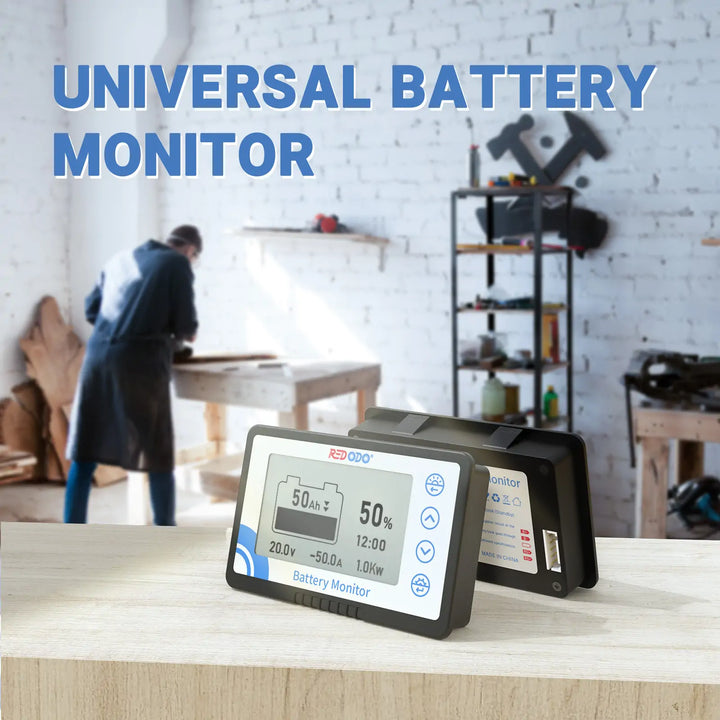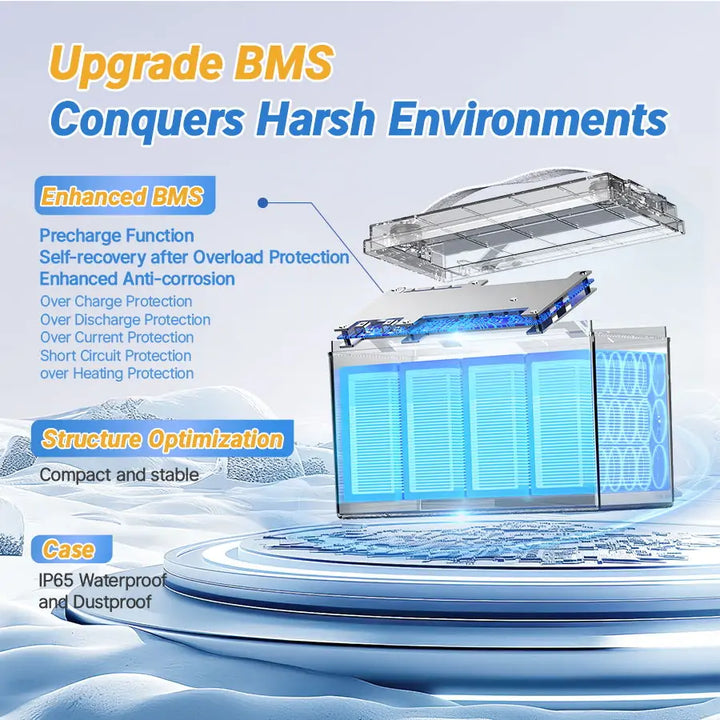A LiFePO4 Battery Management System (BMS) is an essential device in managing batteries, especially in small and portable electronic devices. It ensures that batteries are maintained and charged correctly while also prolonging battery life.
In this article, we will discuss the importance of LiFePO4 BMS and how it can improve battery performance while ensuring safety.

Table of Content
- What is A LiFePO4 BMS?
- How Does A LiFePO4 Battery Management System Work?
- The Functions of A LiFePO4 BMS
- Current Protection
- Voltage Protection
- Temperature Safety
- Over Charge/Discharge Protection
- Short Circuit Protection
- Can I Charge A LiFePO4 Battery Without A BMS?
- FAQs on Battery Management System
What is A LiFePO4 BMS?
A LiFePO4 Battery Management System (BMS) is an electronic system designed to monitor and manage the performance of LiFePO4 batteries. It ensures the battery operates within safe parameters, prevents overcharging and over-discharging, and protects against potential malfunction.
The Lithium iron phosphate battery system functions optimally with the aid of a BMS. It plays a crucial role in maintaining the health and efficiency of the battery, ultimately extending its lifespan.
How Does A LiFePO4 Battery Management System Work?
The operation of a LiFePO4 BMS involves several interconnected components working together to manage the battery's performance effectively. Here’s a breakdown of how it works:
1. Cell Monitoring
Each cell in a LiFePO4 battery pack has unique characteristics, and the BMS monitors these to ensure they operate within safe limits. The BMS measures the voltage, current, and temperature of each cell. By doing so, it can detect any abnormalities that could indicate potential issues, guarantee optimal operation and promote safety.
2. Cell Balancing
To ensure the longevity and efficiency of the battery, the BMS performs cell balancing. This process involves equalizing the charge across all cells in the battery pack. If one cell is overcharged while others are not fully charged, it can lead to reduced performance and lifespan. The BMS redistributes the charge among the cells to maintain a balanced state.
3. Overcharge and Over-discharge Protection
Overcharging or over-discharging a LiFePO4 battery can cause significant damage and pose safety risks. The LiFePO4 BMS is responsible for managing the charge and discharge processes for LiFePO4 battery packs. Whenever there is a deviation from the specifications, the BMS protection feature instantly activates and modifies the charging parameters or cuts off the power flow within the battery pack. This protective mechanism ensures that the battery remains within safe operational limits.
Furthermore, utilizing a BMS optimizes the battery capacity and overall performance in every charge and discharge process, thus enhancing the lifespan and performance of the LiFePO4 battery pack.
4. Thermal Management
Temperature is a critical factor in the performance and safety of LiFePO4 batteries. The BMS monitors the temperature of each cell and the overall battery pack. If the temperature exceeds safe limits, the BMS can take corrective actions, such as reducing the charging or discharging rate, or even shutting down the battery to prevent thermal runaway.
5. Communication and Reporting
A LiFePO4 BMS often includes communication interfaces to share real-time data with external devices and systems. This feature allows users to monitor the battery's status, receive alerts for any issues, and make informed decisions based on the battery’s performance metrics. You can also invest Redodo 12V battery monitor to monitor your battery status and health in real time.

The Functions of A LiFePO4 BMS
Whether used in electric vehicles, renewable energy systems, or portable electronics, a robust BMS is indispensable for optimizing the performance and reliability of LiFePO4 batteries. Here are the key functions of a LiFePO4 BMS:
Current Protection
In LiFePO4 batteries, the charging and discharging current limits are typically set by battery cell manufacturers. While higher peak currents can be handled for short periods, a maximum continuous current limit is imposed by the BMS designed for these batteries to prevent unsafe conditions.
Moreover, sudden changes in load conditions are taken into account. The BMS may also include peak current monitoring by integrating the current and deciding whether to reduce the available current or interrupt the pack current to respond instantly to extreme current peaks.

Voltage Protection
The BMS employs a range of methods to protect the battery's voltage, including:
- Continuous Voltage Monitoring: The BMS continuously monitors the battery pack's voltage using sophisticated sensors or other measurement devices. The measured voltage is compared to predetermined safe limits, and corrective measures are taken if the voltage falls outside this range.
- Overvoltage Safety: The BMS effectively prevents overvoltage by limiting charging current or stopping charging altogether. When the battery reaches its maximum safe voltage, the BMS will turn off the charging circuit to prevent further charging and damage to the battery.
- Undervoltage Protection: Similarly, the BMS protects the battery from undervoltage by preventing over-discharging. The BMS acts by interrupting the discharge process if the battery's voltage drops below a certain level, thus preventing damage to the battery.
Temperature Safety
The BMS ensures that the battery temperature stays within safe limits by continuously monitoring the temperature of the battery pack with sensors or other measurement devices. Thermal management techniques such as passive cooling, active cooling, or heating are implemented to regulate the temperature.
If the battery temperature exceeds its safe range limit, the BMS may limit the charging or discharging rate or shut down the battery to prevent permanent damage.
If your battery is often used in low temperature environment, consider replacing it with Redodo Low Temp Protection Battery, whose upgraded BMS ensures that your battery is protected from damage.

Over Charge/Discharge Protection
Monitoring voltage and current during the charging and discharging processes are critical in protecting the battery from overcharge and over-discharge. The BMS uses different methods such as limiting current or voltage, state-of-charge estimation, multi-cell balancing, and temperature monitoring to regulate the safe operating range of the battery.
Short Circuit Protection
Unpredictable short circuits can harm the battery and connected devices immediately. Continuous monitoring of voltage and current levels enables the BMS to take the appropriate measures, such as limiting charging and discharging rates, disconnecting overheating or overvoltage cells, and using fuses and circuit breakers to shut down the system. The BMS quickly reacts to prevent further damage.
In conclusion, the BMS plays a vital role in protecting rechargeable batteries from overcharge, over-discharge, overheating, short circuits, and unexpected events, enhancing their performance, extending lifespan, and improving safety.
Can I Charge A LiFePO4 Battery Without A BMS?
Although possible to charge a LiFePO4 battery without a BMS, it is strongly discouraged due to potential hazards. Supplying the battery with a charging voltage or current higher than recommended can result in thermal runaway, which can result in a fire or explosion, making this practice hazardous.
To ensure the safety of the battery, it is recommended to closely monitor the charging conditions such as voltage, current, and temperature.
The Redodo batteries are equipped with an integrated BMS that provides comprehensive protection against the most typical causes of battery malfunctions and hazards. By guarding the cells against the possibility of short circuits, high currents, extreme temperatures and voltage fluctuations, the BMS guarantees that the battery operates with utmost safety and efficiency.

FAQs on Battery Management System
Q: How to Choose the Right BMS for My Application?
A: To choose the right BMS for your application, consider the following factors: battery type (e.g., LiFePO4), voltage and current ratings, required features (e.g., monitoring, balancing, protection), and compatibility with your system. Evaluate the communication protocols needed and check for certifications or compliance with industry standards. It's also important to consider the reliability and reputation of the manufacturer.
Q: How to Reset a Battery Management System?
To reset a battery management system, disconnect the battery and any power sources, then reconnect after a few minutes. If available, press the reset button on the BMS. Alternatively, use the manufacturer's software or app to perform a reset. Always refer to the BMS user manual for specific reset instructions.
Q: How Does a BMS Improve Battery Lifespan?
A: By balancing the charge across cells and protecting the battery from harmful conditions, a BMS optimizes the charge and discharge cycles, thereby extending the battery's lifespan.
Q: Can I Monitor My Battery Remotely?
A: Yes, with advanced BMS units, like Redodo 12V Smart Bluetooth Lithium Battery, you can monitor your battery status remotely using a smartphone.
Conclusion
In summary, a LiFePO4 Battery Management System is a critical component that ensures the safe and efficient operation of LiFePO4 batteries. By monitoring and managing key parameters such as voltage, current, and temperature, the BMS protects against potential hazards and extends the lifespan of the battery.
By understanding the functions and importance of a LiFePO4 BMS, you can make informed decisions about integrating these advanced battery systems into your applications, ensuring both safety and efficiency.
At Redodo, our high-quality LiFePO4 batteries are equipped with an integrated BMS that provides comprehensive protection against typical causes of battery malfunctions and hazards. This guarantees that the battery operates with maximum safety and efficiency.
-----------------------------------------------------------------------------------------------------
Read more on
7 Advantages to Upgrade Your RV Power System With LiFePO4 Batteries![[Full Guide] What is LiFePO4 Battery Management System?](http://www.redodopower.com/cdn/shop/files/Reodod_logo1.jpg?crop=center&format=webp&height=24&v=1730185167&width=24)
Redodo
![[Full Guide] What is LiFePO4 Battery Management System?](http://www.redodopower.com/cdn/shop/files/Reodod_logo1.jpg?crop=center&format=webp&height=24&v=1730185167&width=24)
Redodo
Recent Post

Convert RV from Lead-Acid to Lithium Battery: A Complete Guide

How Long Will a 200Ah Battery Run an Air Conditioner?

A Full Review of Redodo 12V 140Ah Group 31 Deep Cycle Battery

How Much Does it Cost to Replace Golf Cart Batteries?

![⚡[$220 after Sign-Up] Redodo 12V 100Ah LiFePO4 Lithium Battery | Best Budget | For RV, Solar, Trolling Motor](http://www.redodopower.com/cdn/shop/files/Redodo_12v_100ah_lithium_battery_b9015ddd-64b5-4be2-8c88-392f0bb4ab30.jpg?v=1742973160)
![⚡[$220 after Sign-Up] Redodo 12V 100Ah Group 24 Deep Cycle LiFePO4 Lithium Battery | For Home, RV, Marine](http://www.redodopower.com/cdn/shop/files/Redodo_12V_100Ah_group_24_lithium_battery_6301965d-f6e8-467f-825f-3eec839b3e1f.jpg?v=1744105344)
![⚡[$220 after Sign-Up] Redodo 12V 100Ah Lithium Trolling Motor Battery With Low Temp Protection](http://www.redodopower.com/cdn/shop/files/Redodo12V100Ahlow-tempbattery.webp?v=1738462317)


![⚡[$377 after Sign-Up] Redodo 12V 200Ah Lithium LiFePO4 Battery | 1280W Load Power | For RV, Solar, Off-Grid](http://www.redodopower.com/cdn/shop/files/Redodo12V200ahlithiumbattery.jpg?v=1735892910)
![⚡[$947 after Sign-Up]Redodo 24V 200Ah LiFePO4 Lithium Battery | Marine, Solar Home, Home Back up](http://www.redodopower.com/cdn/shop/products/24v200ahlithiumbattery-1.jpg?v=1735893113)
![⚡[$524 after Sign-Up] Redodo 12V 300Ah Lithium LiFePO4 Battery | Replaces 6*12V 100Ah AGM Batteries | RV, Marine, Solar](http://www.redodopower.com/cdn/shop/files/Redodo_12V_300ah_lithium_deep_cycle_battery.png?v=1744797523)